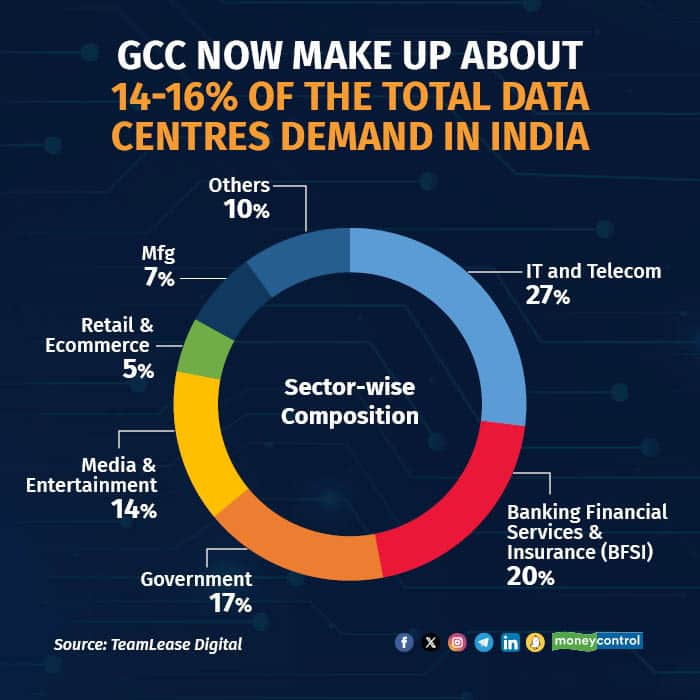



The rapid expansion of Global Capability Centres (GCC) is propelling the growth of data centres in India, making up approximately 14-16 percent of the total demand for data centres, from a negligible share just three years ago.
Of the total GCC demand for data centres, GCCs operating in the technology and telecom vertical constitute about 27 percent, followed by banking, financial services, and insurance (BFSI) at 20 percent, showing exclusive data accessed by Moneycontrol from TeamLease Digital.
GCCs, which are dedicated offshore centres set up by a company to in-source IT and other related business functions, have come into the spotlight of late due to their hiring spree, which has outpaced that of IT service companies.
Also read: GCCs gain traction among foreign SMBs seeking Indian tech talent
“The 2X rise in GCCs, GICs (Global In-house Centre) and GBS (Global Business Services) in India… and the rising demand for cloud services & data management facilities, has created the need for a high-intensive infrastructure facility,” said Munira Loliwala, assistant vice president-strategy and growth, TeamLease Digital.
She said the expansion of fifth-generation (5G) networks, and companies’ focus on being energy efficient, are also fuelling the rise of data centres in the country.

When it comes to data centres, India has been a laggard hitherto but is catching up on the back of aggressive adoption of advanced technologies such as artificial intelligence (AI), machine learning (ML), and data analytics. In just four years, India has witnessed a threefold increase in its data centre capacity, TeamLease data shows.
Currently, India’s operational data centre capacity stands at 1.1 gigawatts, with another 1.7 gigawatts either under construction or planned in the coming five years, according to data from Cushman & Wakefield. Currently, India is the 13th largest data centre hub in the world.
Other factors driving the growthFrom social media and e-commerce to digital transactions and online gaming, the digital ecosystem is thriving, giving further impetus to demand for cutting-edge data centre infrastructure.
“New markets are also opening… and that's one of the reasons why the GCC growth continues to be very, very encouraging,” Lalit Ahuja, Founder & Chief Executive Officer (CEO) of ANSR Inc, told Moneycontrol recently. ANSR Inc. builds, manages, and scales GCCs in India.
Another reason why GCCs are rapidly availing the services of data centres is the recent data localisation requirements, which are part of the Digital Personal Data Protection Act, 2023, Snehil Gambhir, partner and director at consulting firm Boston Consulting Group, told Moneycontrol. “That can influence the data storage and data centre approach GCCs adopt,” Gambhir said.
The Act specifies that the central government can specify countries where personal data can be transferred, with a penalty of Rs 10 crore for flouting data localisation norms.
Additionally, the boom in India's data centre sector is supported by the GCC demand for cloud services, Loliwala said. Moreover, the advent of hybrid workplaces increases this growth trajectory, as businesses seek robust data centre solutions to facilitate seamless remote operations, she added.
Facing challengesThe rise in demand is also bringing its share of challenges.
From pressure to trim operational costs to infrastructural gaps, scarcity of skilled talent, and mounting capital expenses, Loliwala said, data centre operators grapple with many hurdles. Construction costs are on the rise, necessitating an increase in prices by up to 1.5-2 times to meet the high demand.
Rapid growth in investments in the sector is also raising costs for setting up data centres with the overall cost of capital, land, and people being very high, Loliwala said.
Despite the concentration of data centres in major metropolitan hubs such as Mumbai, Chennai, and Bengaluru, there is a growing recognition of the untapped potential in Tier II and III cities. “Because of the GCC spread, Tier II and III cities such as Pune, Nagpur, Kolkata, Kochi, Coimbatore and Vadodara are becoming hub spots for data centres,” Loliwala said.
She listed three major reasons for this phenomenon: increasingly available fibre connectivity in these cities, proximity to their customers and availability of skilled talent.
The growth in GCCs and rapid digital transformation coupled with technological innovation are leading to a huge demand for data centres in India.
Also read: IT companies say GCCs won't hit revenues, forge more tie-ups

Discover the latest Business News, Sensex, and Nifty updates. Obtain Personal Finance insights, tax queries, and expert opinions on Moneycontrol or download the Moneycontrol App to stay updated!
Find the best of Al News in one place, specially curated for you every weekend.
Stay on top of the latest tech trends and biggest startup news.